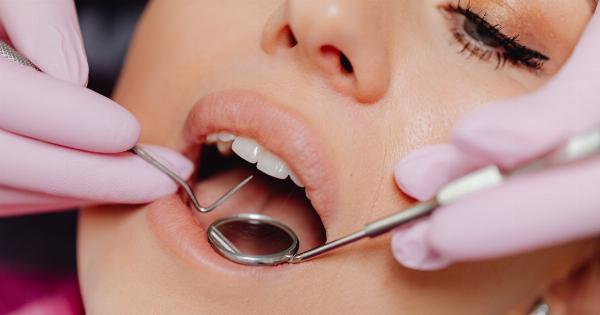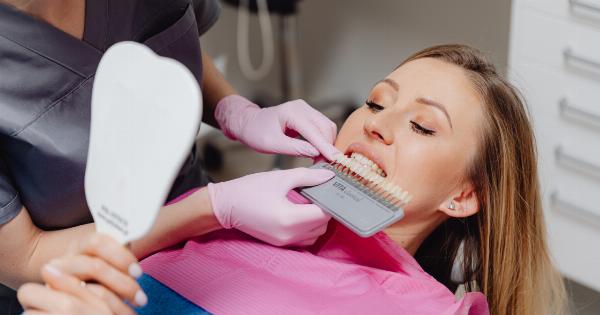Pregnancy is a special phase in a woman’s life that brings about numerous bodily changes. While most people are aware that pregnancy affects hormonal levels and overall health, many are unaware of the impact it can have on oral health.
Pregnancy gingivitis is a common condition that pregnant women may experience, causing inflammation and bleeding of the gums.
The Link between Pregnancy and Gingivitis
During pregnancy, hormonal fluctuations occur, particularly an increase in estrogen and progesterone levels. These hormonal changes can affect the body’s response to plaque, the sticky film of bacteria that forms on teeth and gums.
If not properly removed through regular brushing and flossing, plaque buildup can lead to gum inflammation and irritation.
Identifying the Symptoms
Pregnancy gingivitis typically presents with various symptoms that can significantly impact oral health. These symptoms may include:.
- Tender and swollen gums
- Gums that bleed easily, especially during brushing or flossing
- Receding gumline
- Persistent bad breath
- Formation of pregnancy tumors on the gums (localized swelling, usually harmless)
If you experience any of these symptoms during pregnancy, it’s essential to consult with your dentist or periodontist for a proper diagnosis and treatment plan.
The Importance of Oral Care during Pregnancy
Oral care plays a crucial role in maintaining good overall health, especially during pregnancy. Proper oral hygiene can help prevent or manage pregnancy gingivitis and its potential complications. Follow these oral care tips:.
- Brush your teeth at least twice a day using a soft-bristled toothbrush and fluoride toothpaste.
- Floss daily to remove plaque buildup between teeth and along the gumline.
- Use a mouthwash recommended by your dentist to reduce bacteria and freshen your breath.
- Maintain a healthy diet with essential nutrients that support oral health.
Importance of Regular Dental Check-ups
Regular dental check-ups are crucial during pregnancy to ensure optimal oral health. Your dentist can detect and treat any dental issues, including pregnancy gingivitis, before they worsen.
Additionally, your dentist can provide professional cleanings to remove stubborn plaque and tartar buildup that regular brushing may not remove.
Inform your dentist about your pregnancy during your visit, as they may modify certain treatments or medications to ensure the safety of both you and your baby.
Natural Remedies for Pregnancy Gingivitis
While maintaining good oral hygiene is essential, pregnant women can also adopt some natural remedies to alleviate the symptoms of pregnancy gingivitis. These remedies include:.
- Gently massaging your gums with a soft toothbrush or clean finger
- Rinsing your mouth with warm saltwater solution several times a day
- Applying a cold compress to swollen gums to reduce inflammation
However, it is crucial to consult with your dentist before trying these remedies to ensure they are suitable for your specific situation.
When to Seek Professional Treatment
If you notice persistent or worsening symptoms of pregnancy gingivitis, it is essential to seek professional treatment. Your dentist or periodontist may recommend:.
- Additional dental cleanings to remove plaque and tartar buildup
- Antibacterial mouth rinse to reduce bacteria in the oral cavity
- Professional scaling and root planing to treat gum disease if it has progressed
- Periodontal surgery in severe cases of gum disease
Preventing Pregnancy Gingivitis
Prevention is always better than cure. To reduce the risk of pregnancy gingivitis, follow these preventive measures:.
- Maintain good oral hygiene throughout pregnancy
- Eat a well-balanced diet rich in vitamins and minerals
- Limit sugary snacks and drinks that can contribute to tooth decay
- Avoid tobacco and alcohol, which can harm your oral and overall health
- Stay hydrated to promote saliva production, which helps fight bacteria
Consulting with Your Healthcare Provider
In addition to regular dental check-ups, it is crucial to keep your healthcare provider informed about your oral health during pregnancy. They can work collaboratively with your dentist to ensure comprehensive care.
Share any concerns or changes in your oral health with both professionals to receive the best guidance and treatment.
Conclusion
Pregnancy gingivitis is a common condition that many pregnant women experience due to hormonal changes. It is essential to prioritize oral health during pregnancy to prevent and manage pregnancy-related gum problems.
By maintaining good oral hygiene, seeking regular dental check-ups, and following preventive measures, you can keep pregnancy gingivitis at bay and maintain a healthy and beautiful smile throughout your journey to motherhood.






























